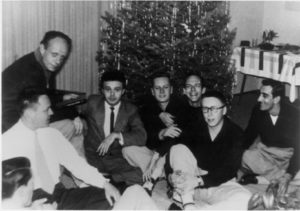Dale Jennings (1917-2000) was a writer, producing and stage director in Los Angeles and Pasadena. He studied dance with Lester Horton and Martha Graham, and served in the U.S. Army stationed in the Asiatic-Pacific theater. He was awarded a World War II Victory Medal, an American Campaign Medal, and Asiatic-Pacific Campaign Medal, and a Philippine Liberation Ribbon.
 In 1950 he was one of the original founders of the Mattachine Society.
In 1950 he was one of the original founders of the Mattachine Society.
In 1952 he was arrested for indecent behavior, and they decided to fight the charge in court under grounds of entrapment. After a dramatic court trial, Jennings was acquitted, which energized other persecuted homosexual people into action throughout the nation and brought respect to the Mattachine Society. Most states have removed the infamous “Crimes Against Nature” statutes, party due to the influence of Dale Jennings.
He went on to publish ONE Magazine, dedicated to speaking out for homosexuals and sold on newsstands and by mail subscription. In 1954, the mailing was confiscated by the Los Angeles Postmaster on the basis of obscenity. The Federal Court case that followed ended with a 1958 U.S. Supreme Court decision ruling that a magazine calling for equality for homosexuals is not obscene. This decision brought more freedom to all media and was the basis for all future growth of the gay and lesbian press.
Source: http://www.outhistory.org/wiki/Dale_Jennings
The Temperamentals
Justin Ison will portray Dale Jennings and others in Arouet’s upcoming production of The Temperamentals, which recalls the founding of the Mattachine Society. Contribute to our Kickstarter campaign to bring their story to the Seattle stage.



